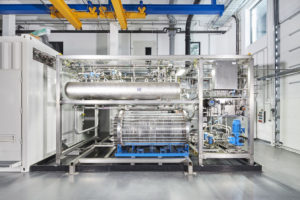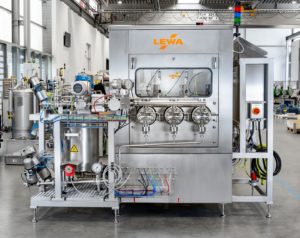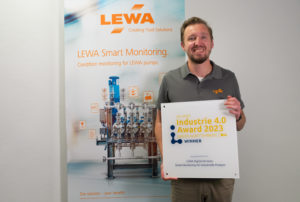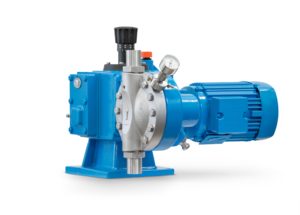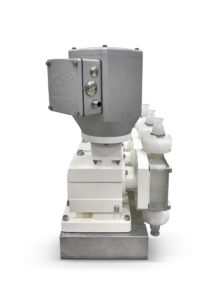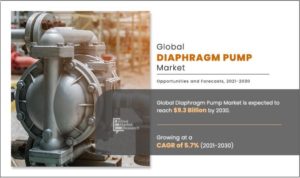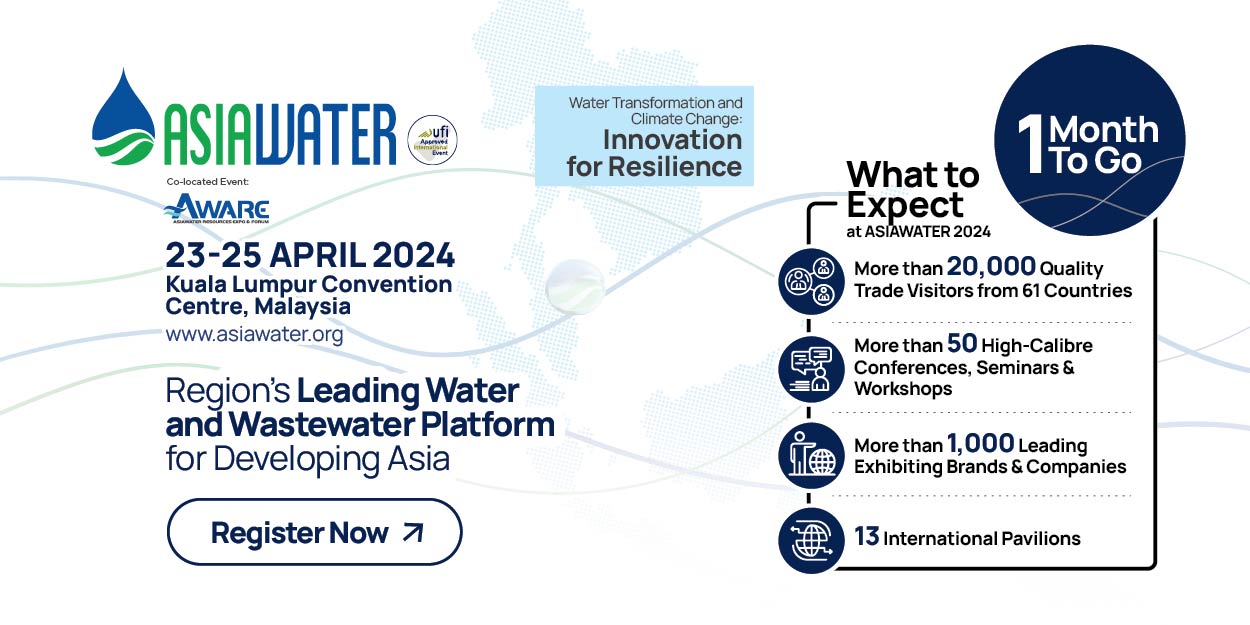Hygienic Double Screw Pump Conveys Disinfection Gel
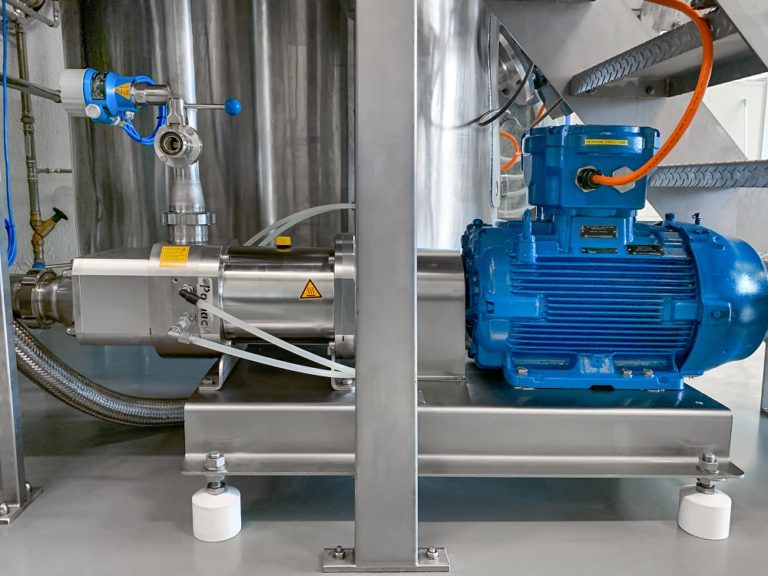
: In the future, the new pump will take over the automated, process-safe transport of the finished bulk from the agitator to the tank farm. From there, filling takes place on the various filling lines. The choice fell on a double screw, PDSP-type pump from LEWA NIKKISO Switzerland AG (in the photo: installed state). (Image source: Steinfels Swiss)
Due to continued high demand, Steinfels Swiss, as a certified producer of hand and surface disinfectants, decided in mid-2020 to renew an existing production plant at the Winterthur production facility under ATEX conditions and use it to manufacture gel products. In the course of these measures, a new pump was purchased to take over the automated, process-safe transport of the finished bulk from the agitator to the tank farm. From there, filling takes place on the various filling lines. The choice fell on a double screw, PDSP-type pump from LEWA NIKKISO Switzerland AG. The pump can be operated at high speeds and thus easily convey media in the viscosity range of 1 to 6,000 mPa required in gel production. In addition, due to the pumping principle, consistently high and continuous performance is ensured even with changing flow rates and viscosities. The new screw spindle pump at Steinfels Swiss has ensured the ATEX-compliant metering of 15 m³/h of disinfectant at 3 bar since March 2021.
"Due to the coronavirus, the demand for disinfectants has skyrocketed, so in 2020 we decided to renovate our entire ATEX production area – which was already aging – and expand our production capacity," explained Beat Brogli, head of technology at Steinfels Swiss. After the market's demand for disinfection gels also increased significantly, the company decided to design a new stirring tank for the production of gel products and integrate it into the manufacturing process in the course of the conversion measures. A PDSP twin screw pump from LEWA NIKKISO Switzerland AG was purchased to automatically pump the finished products into the tank farm. "In the past, we used mobile pumps and hoses to transfer many products," Brogli added. "The new unit is now permanently installed and integrated into the cleaning process." The automated transfer of the finished bulk enables a safe, ATEX-compliant process.
Unit for media with wide viscosity range
Steinfels Swiss decided in favor of a PDSP based on the detailed advice provided by LEWA NIKKISO Switzerland AG, alongside a very successful pilot project in which existing units were replaced with custom-made double screw pumps. Thanks to their high pressure stability, units of this type can be used up to 16 bar at temperatures up to 136 °C and achieve a maximum flow rate of 90 m³/h. The twin screw pumps can be operated at very high speeds of up to 3,600 rpm. This makes them particularly well suited for conveying thin-bodied to highly viscous fluids and they can also be used as CIP pumps for the medium to be pumped. "They are highly suitable for applications such as metering finished gel products at Steinfels Swiss, as they cover the required viscosity range of 1 to 6,000 mPa," confirmed Pietro Pettoruto, managing director of LEWA NIKKISO Switzerland AG.
For reliable and efficient operation, these pumps feature two precision-engineered screw spindles that provide optimized tolerance. This series is particularly suitable for sensitive and shear-sensitive products as the screws do not touch. Instead, the product is pushed forward through the screw thread without pulsation. Each pump size can be operated with two different spindles. Two different spindle types are available for each size, each with a specific thread pitch. Hardened spindles are used in the gel application at Steinfels Swiss. The free ball passage can be up to 30 mm depending on the type and enables media with large differences in viscosity to be conveyed equally. "Screw spindle pumps offer the advantage of a linear flow principle. This enables simple, cost-effective flow rate control via motor speed, as well as consistently high and continuous output, even when flow rates and viscosities change," Pettoruto summarized.
Adaptation possibilities for sealing materials
The models are quite compact and do not require an elastomer as a stator as compared to progressive cavity pumps. "This eliminates several problems, such as elastomer abrasion during line compression with the rotor and costly elastomer replacement or exchange," Pettoruto said. In addition, the PDSP is self-priming, which means that it can vent the pump's suction line independently and without external auxiliary equipment. The units have a minimum dead space design and are made of high-quality stainless steel. All parts in contact with the product have a roughness < 0.8 µm as standard and can be polished to a value of < 0.5 µm. The gear, base plate and coupling guard are made of stainless steel, enabling the pumps to be easily cleaned from the outside. Single or double mechanical seals made of SIC, tungsten carbide or PTFE lip seals are used for the shaft seal. The O-rings are made of FKM, EPDM, PTFE or FFKM, for example. Since the pump cover can simply be unscrewed, the plants can be opened easily for maintenance work.
"For application in the ATEX zone at Steinfels Swiss, the pump was equipped with a double mechanical seal and O-rings made of EPDM in accordance with FDA and EC1935/2004, and the base plate was manufactured to customer specifications," said Pettoruto. Since March 2021, the unit has been reliably transporting gel disinfectant at 3 bar at 15 m³/h. In the first six months after the entire ATEX production was renovated, a total of around 700 t of disinfectants were produced there.
Source: LEWA GmbH

